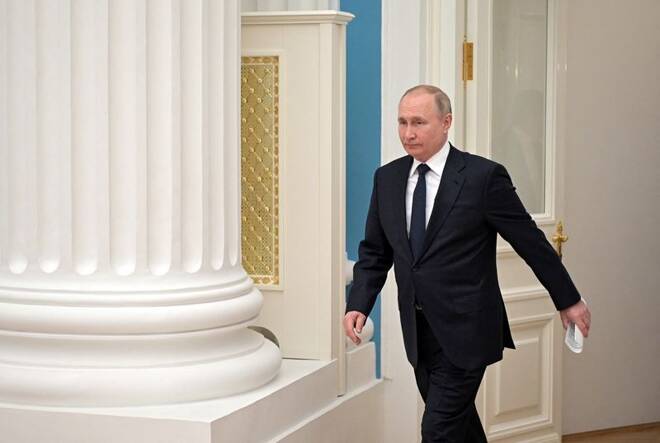Advertisement
Advertisement
Putin tells Russia’s billionaires to put patriotism before profit
By:
MOSCOW (Reuters) - President Vladimir Putin on Thursday urged Russia's billionaires and business elite to invest in new technology, production facilities and enterprises to help Russia overcome what he said were Western attempts to destroy its economy.
MOSCOW (Reuters) -President Vladimir Putin urged Russia’s billionaires on Thursday to put patriotism before profit, telling them to invest at home to shore up the economy in the face of Western sanctions.
Addressing Russia’s business elite in person for the first time since the day he sent his troops into Ukraine on Feb. 24 last year, Putin told them their role was not just to make money but to support society.
“A responsible entrepreneur is a real citizen of Russia, of his country, a citizen who understands and acts in its interests,” Putin said.
“He does not hide assets offshore, but registers companies here, in our country, and does not become dependent on foreign authorities.”
He hailed the “high mission” of entrepreneurs who looked after their workers and directed their talents not just towards extracting profit but also for the public good.
Billionaires Oleg Deripaska, Vladimir Potanin, Alexei Mordashov, German Khan, Viktor Vekselberg, Viktor Rashnikov, Andrei Melnichenko and Dmitry Mazepin – whose interests range from metals and banking to fertilisers – were among those in attendance at the gathering.
Putin said he wanted to hear their views on how to build a more dynamic economy that would lead to “a noticeable improvement in the quality of life of people across the country”.
Though welcomed with a standing ovation, he was delivering a tough message to Russia’s richest: that they need to think more about the needs of the country and less about their own bottom line.
When he met with them at the start of the war, Putin told them he had been left with no choice but to launch his “special military operation” – in effect forcing them into a public display of consent.
Many of the tycoons, known as oligarchs, were subsequently placed under sanctions by the West – something Putin has used as an argument that investing at home is safer. Last month he told business leaders that ordinary Russians had no sympathy for the confiscation of their yachts and palaces.
Economy resists sanctions
The president said on Thursday that what he called an attempt to destroy Russia’s economy with sanctions had failed. But he also sounded a note of urgency, saying the country could not afford to sit back.
“I understand perfectly the threats that are taking place and what the ill-wishers are telling us, saying that Russia will have problems in the medium term. Yes, this is a threat we must keep in mind,” he said.
“I urge you not to wait for these negative consequences of this medium term to come … You need to act right now.”
In the clearest sign of rising demands on big business, the government – faced with a widening budget deficit – plans to raise around 300 billion roubles ($3.9 billion) in a windfall tax, though this will not affect oil, gas and coal firms.
Finance Minister Anton Siluanov said the tax would be set at around 5% of excess profits, TASS news agency reported. The levy will come into force legally from 2024, but the finance ministry expects companies to make payments this year as well, he said.
Russia is hoping to bring about economic growth this year, after a 2.1% slide in 2022. Economy Minister Maxim Reshetnikov told the congress that GDP and investment would grow this year, but stopped short of giving estimates.
The economy proved unexpectedly resilient in the face of sanctions last year, but a return to pre-conflict levels of prosperity may be far off as more government spending is directed towards the military.
Putin has effectively placed large parts of the economy on a war footing, with defence factories working round the clock to churn out weapons, ammunition and equipment.
(Reporting by Reuters; writing by Mark Trevelyan, Jake Cordell and Alexander Marrow; Editing by Kevin Liffey)
About the Author
Reuterscontributor
Reuters, the news and media division of Thomson Reuters, is the world’s largest international multimedia news provider reaching more than one billion people every day. Reuters provides trusted business, financial, national, and international news to professionals via Thomson Reuters desktops, the world's media organizations, and directly to consumers at Reuters.com and via Reuters TV. Learn more about Thomson Reuters products:
Advertisement
